Everett Transit is evaluating three proposals to revise operations of the local bus network that would go in effect sometime in August. Two of the proposals offer minor adjustments to routings in Downtown and Silver Lake while another would dramatically change the service patterns of three routes in North Everett.
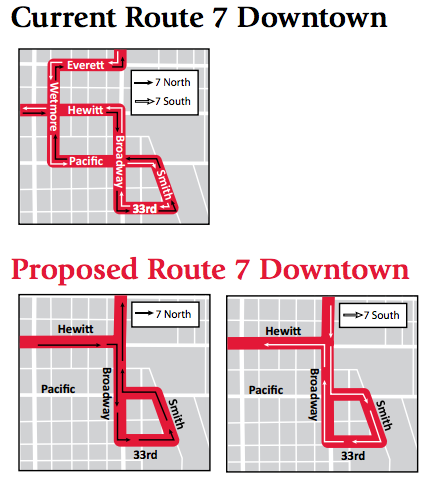
Route 7 is somewhat circuitous with its service pattern in Downtown Everett in an effort to provide coverage to the city center. Service planners have suggested that route be a little less mangled by deleting a jog from Broadway to Wetmore Avenue. Instead, buses will continue in both directions on Broadway without heading to and from Wetmore via Everett Avenue and Pacific Avenue. The change should speed up trip times by a few minutes and improve reliability.
Route 29 connects South Everett and North Everett via a north-south corridor primarily on Broadway. Service planners have proposed small revision to trips for the southern leg of Route 29 near the Silver Lake area due to customer requests and new residential construction. Select trips on Route 29 already serve Silver Lake on a loop south of 112th St SE, but the new proposal would make this a permanent feature of the route. With the addition of the loop for all services, trip times could be slightly revised, but the span of service should remain about the same.
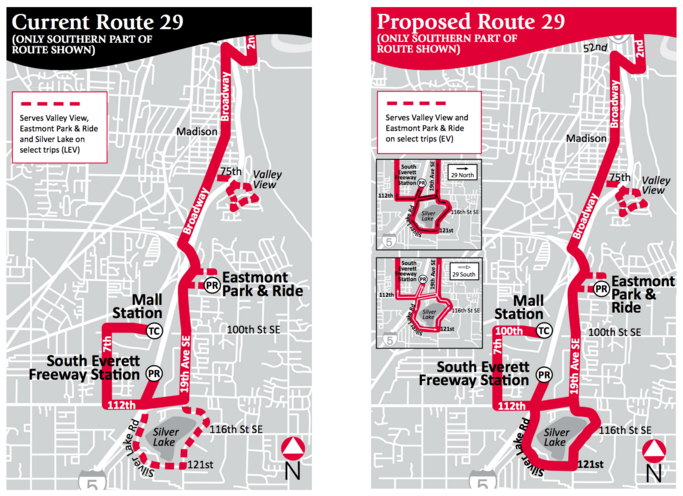
The biggest change proposed involves three routes, two of which currently serve North Everett and a third that would be extended further north to replace service.
Route 4 and Route 5 each operate as loop routes between Downtown Everett and North Everett. Together, they provide service between key destinations like Everett Station, Downtown Everett, Everett Community College, and the Providence Hospital campuses. Route 4 is essentially the clockwise version of the loop route while the Route 5 operates in the opposite direction – anti-clockwise. Service on both routes is hourly on weekdays while Route 5 operates the sole loop service hourly on Saturdays and Sundays. Service planners want to simplify the routes by creating a consolidated, bi-directional route. To do this, they propose splitting portions of the routes.
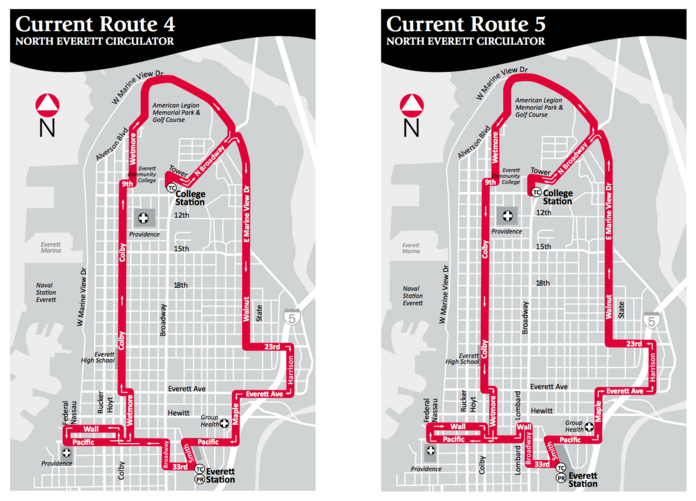
A New Route 4 would be created by deleting Route 5, removing the Colby/Wetmore routing, and sending Route 4 in both directions. Service on the route would technically be an upgrade with hourly service all days of the week; the improvement will be particularly noticeable for weekend riders.
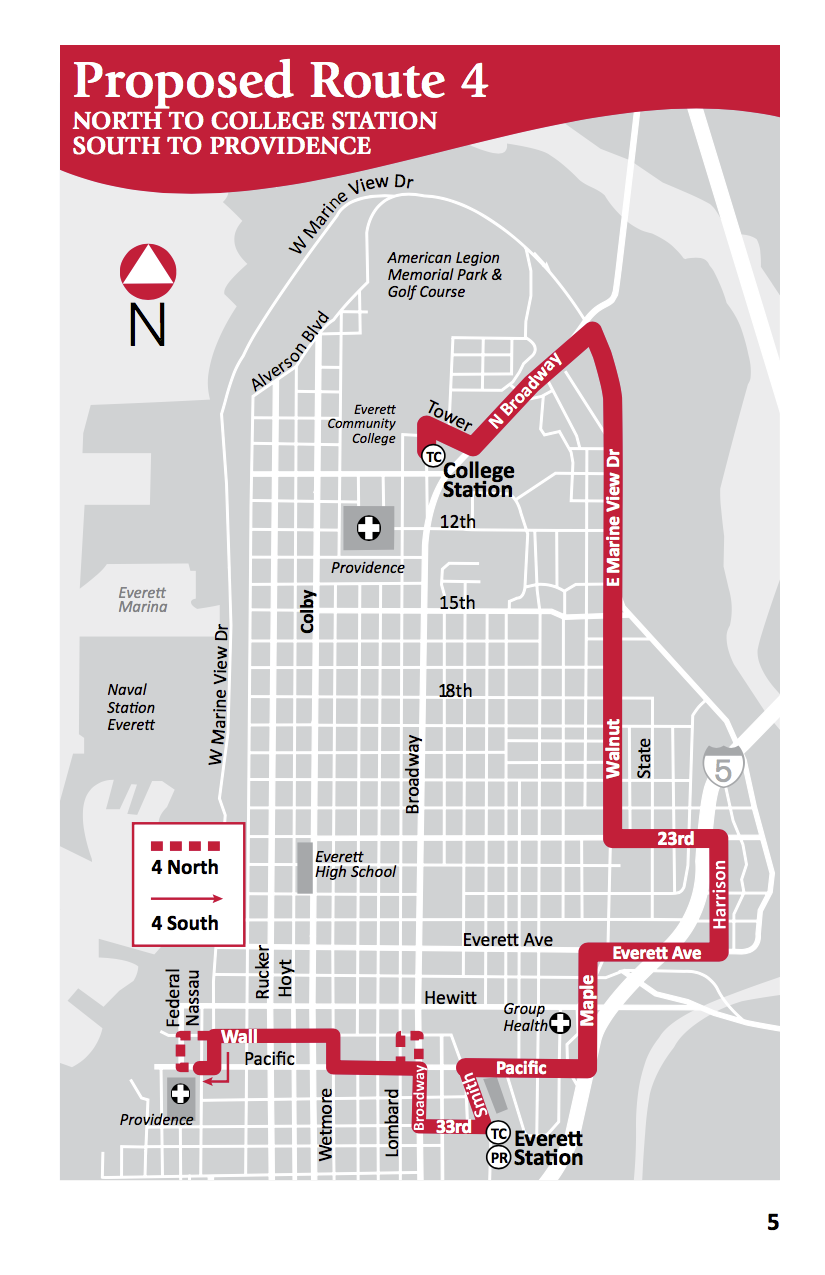
To make up for the loss of service on the Colby/Wetmore leg of Route 4 and Route 5, service planners propose an extension of Route 17. That route currently operates hourly on weekdays between the Everett Mall and Everett Station with a small jog through Downtown Everett. The proposed revision, however, would remove the jog in Downtown Everett for trips between Everett Station and the Everett Mall. Northbound trips starting from the Everett Mall would be sent toward Everett Station using today’s routing minus the Downtown Everett jog and then continue northward to College Station in North Everett by heading back on Pacific Avenue and north onto Wetmore/Colby; southbound trips will do the opposite. Service on Route 17 would also be expanded to weekends and be similar to the current Route 5.
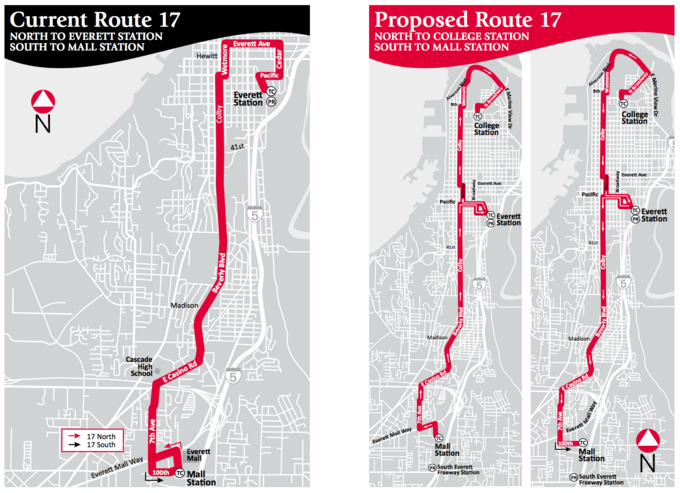
The overall revision should result in better service for bus riders in North Everett by creating more legible routes and extended span of service.
All three proposals are open to public comment through April 1st. You can provide your feedback to service planners by sending it to etmail@everettwa.gov. Or you can attend one of the two remaining public meetings this week: the first meeting will be held this evening (Wednesday, March 23rd) from 5pm to 7pm at Everett Station; the second meeting will be held tomorrow (Thursday, March 24th) from 10am to Noon at The Vintage in Everett. The final plan will be presented on Friday, May 13th at Everett Station.
Stephen is a professional urban planner in Puget Sound with a passion for sustainable, livable, and diverse cities. He is especially interested in how policies, regulations, and programs can promote positive outcomes for communities. With stints in great cities like Bellingham and Cork, Stephen currently lives in Seattle. He primarily covers land use and transportation issues and has been with The Urbanist since 2014.



